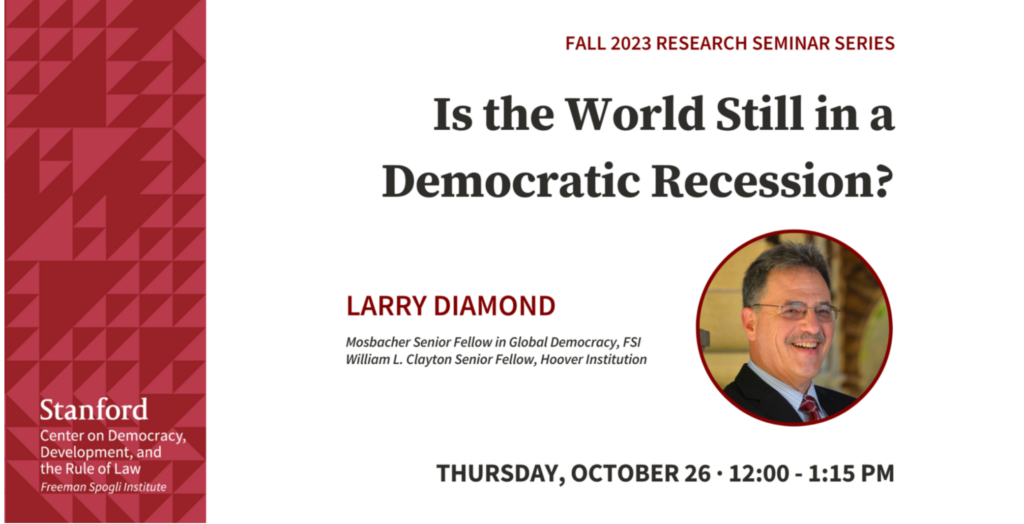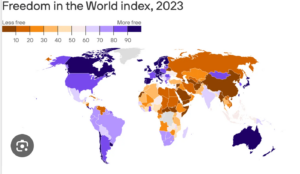
“Democracy’s Surprising Resilience” is the focus of an article in the National Endowment for Democracy‘s Journal of Democracy. Steve Levitsky and Lucan Way write that authoritarians have found it difficult to consolidate power in countries with weak states, suggesting that democratic backsliding and the degree of autocratization are exaggerated.
In its 2023 “Freedom in the World” report, Freedom House detected signs of a possible “turning point” away from the steady trend of receding freedom over the past decade and a half, notes Stanford’s Center on Democracy, Development and the Rule of Law.
 For the first time since 2006, about as many countries gained in freedom as declined, and the egregious mistakes of authoritarian regimes in Russia, China, Venezuela, and Iran exposed “the limits of [these] authoritarian models.” Illiberal populists suffered electoral defeats in several European Countries, including the Czech Republic earlier this year, showing that this model can be beaten at the polls. Yet press freedom and civil liberties continue to recede in India, Erdogan has been “reelected” in Turkey, and democracy is under significant pressure from populist and other authoritarian forces in Latin America and Africa.
For the first time since 2006, about as many countries gained in freedom as declined, and the egregious mistakes of authoritarian regimes in Russia, China, Venezuela, and Iran exposed “the limits of [these] authoritarian models.” Illiberal populists suffered electoral defeats in several European Countries, including the Czech Republic earlier this year, showing that this model can be beaten at the polls. Yet press freedom and civil liberties continue to recede in India, Erdogan has been “reelected” in Turkey, and democracy is under significant pressure from populist and other authoritarian forces in Latin America and Africa.
How should we interpret these diverse trends? Is the world still in a “democratic recession“?
Thursday October 26. 12 noon. RSVP
 Larry Diamond is the William L. Clayton Senior Fellow at the Hoover Institution, the Mosbacher Senior Fellow in Global Democracy at the Freeman Spogli Institute for International Studies (FSI), and a Bass University Fellow in Undergraduate Education at Stanford University. He leads the Hoover Institution’s programs on China’s Global Sharp Power and on Taiwan in the Indo-Pacific Region. At FSI, he leads CDDRL’s Program on Arab Reform and Democracy and also co-leads with (Eileen Donahoe) the Global Digital Policy Incubator, based at FSI’s Cyber Policy Center. He is the founding coeditor of the Journal of Democracy and serves as senior consultant at the National Endowment for Democracy’s International Forum for Democratic Studies.
Larry Diamond is the William L. Clayton Senior Fellow at the Hoover Institution, the Mosbacher Senior Fellow in Global Democracy at the Freeman Spogli Institute for International Studies (FSI), and a Bass University Fellow in Undergraduate Education at Stanford University. He leads the Hoover Institution’s programs on China’s Global Sharp Power and on Taiwan in the Indo-Pacific Region. At FSI, he leads CDDRL’s Program on Arab Reform and Democracy and also co-leads with (Eileen Donahoe) the Global Digital Policy Incubator, based at FSI’s Cyber Policy Center. He is the founding coeditor of the Journal of Democracy and serves as senior consultant at the National Endowment for Democracy’s International Forum for Democratic Studies.
The Cultural Roots of Democratic Backsliding
 Does an erosion of democratic institutions and values provide opportunities for authoritarian political actors? Carleton University asks. Or do leaders who come to power through free and fair elections gradually weaken checks and balances, and thus undermine liberal democracy? How does democratic backsliding occur, and how do institutional designs matter? Harvard University’s Pippa Norris, co-author of Cultural Backlash (right), draws on new evidence from the Varieties of Democracy project, the Global Party Survey, and the World Values Survey, as well as case studies of Hungary, India, Brazil, and the United States.
Does an erosion of democratic institutions and values provide opportunities for authoritarian political actors? Carleton University asks. Or do leaders who come to power through free and fair elections gradually weaken checks and balances, and thus undermine liberal democracy? How does democratic backsliding occur, and how do institutional designs matter? Harvard University’s Pippa Norris, co-author of Cultural Backlash (right), draws on new evidence from the Varieties of Democracy project, the Global Party Survey, and the World Values Survey, as well as case studies of Hungary, India, Brazil, and the United States.
Political Science Online Lecture: The Cultural Roots of Democratic Backsliding – Pippa Norris, Harvard University. Thursday, November 16, 10:00-11:30 am Eastern Standard Time (on Zoom). RSVP
📚BOOK EVENT | Join @ThinkDemocracy and @JoDemocracy for a virtual event featuring contributors from the new book “Defending Democracy in an Age of Sharp Power.”
📅 October 30, 2023
🕚 11:00 AM EDT
📍 VirtualRegister today! 🔽https://t.co/DKV6RKiMdA
— Forum @ NED (@ThinkDemocracy) October 13, 2023







